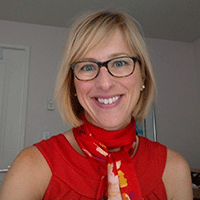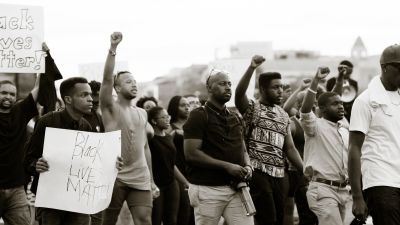
At any one time in this country, about 450,000 people are behind bars awaiting trial, and the vast majority of these people — 5 out of 6 — are there simply because they cannot afford the bail a judge has set. (Photo by Andrew Lichtenstein/Corbis via Getty Images)
This post originally first appeared at Yes! Magazine.
When Dorothy Hinton-Adams was arrested for allegedly shoplifting a can of peanuts in May, she didn’t have the money to pay for her bail, which a judge set at $500.
No bail bond company would help her, so Hinton-Adams, 71, was forced to stay in Fulton County Jail in Atlanta until her court date. “After the 15th day, I got kind of panicky,” Hinton-Adams said. “So I asked around how I could find out if I had a court date? There was a lady in there who wrote down my name and booking number.”
That night, a stranger appeared and paid the $500 to bail out Hinton-Adams.
Hinton-Adams is among some 60 women across the South freed during Black Mamas Bail-Out, a coordinated, monthlong effort in May by the grass-roots group Southerners on New Ground to highlight the injustice of cash bail and its disproportionate impact on women of color and LGBTQ women.
At any one time in this country, about 450,000 people are behind bars awaiting trial, and the vast majority of these people — 5 out of 6 — are there simply because they cannot afford the bail a judge has set.
While lawyers and policy advocates launch pilot projects aimed at nudging jurisdictions to reduce the number of people they lock up pre-trial, community bail funds — either ongoing endeavors or one-off programs such as Black Mamas Bail-Out — take a different approach: Get them out now.
“You don’t have to wait for a law, you don’t need a litigation strategy. You just get them out, and you change their lives,” said David Feige, co-founder of the Bronx Freedom Fund, the pioneer of the current wave of community bail funds. Grass-roots activists frequently contact the Bronx Freedom Fund to get advice on how to set up bail funds in their own communities, Feige said.
“It’s a turnkey operation. They’re very easy to set up. It’s scalable,” he said.
Bail was originally intended as a deposit to ensure that an accused person would return to court. But in recent years, judges have been setting bail higher and higher. Between 1992 and 2009, there was a 43-percent increase, after adjusting for inflation, in the amount of bail imposed in felony cases in the 75 largest counties in the US.
The overall effect is that people who have not been convicted of any crime are increasingly filling America’s jails. Ninety-five percent of the growth in the overall jail inmate population in the US since 2000 was just people in jails awaiting trial. Poor people, people of color and people with certain disabilities are more likely to be held in jail before trial and to be assigned high bail amounts, and thus face a greater likelihood that they’ll end up with a criminal conviction.
Ninety-seven percent of the more than 1,000 people the Bronx Freedom Fund has bailed out have shown up for court, Feige said. When those who have received bail from community bail funds show up for court, it demonstrates the injustice of holding people behind bars before trial simply because they are poor.
“About 50 percent of cases we bail out get dismissed,” Feige said. “They were crap cases. Of the remaining 50 percent, half of those result in noncriminal dispositions, and in the history of the fund, almost no one ever has gone back to jail. We have a radical effect on case outcomes just by posting bail.”
Community bail funds give people accused of crimes a better chance for a fair trial. Studies show people who are jailed before trial are more likely to receive a jail or prison sentence, and for a longer time, than those who are free.
This is partly because being incarcerated is so horrible and so packed with collateral consequences for individuals and their communities — loss of income, job and housing, and stress on families, to name a few — that most are willing to do anything to avoid it, even if it means disregarding their own innocence to accept a criminal conviction and the discrimination and stigma that come with it.
“Faced with ‘plead guilty, get out; maintain innocence, stay in,’ pretty much everyone makes the decision to plead guilty,” Feige said.
Plea agreements have become so prevalent in America’s courts that only about 5 percent of criminal cases at either the state or federal level ever go to trial. In misdemeanor proceedings where public defense is involved, plea bargaining is also the default setting, a tendency derided by critics as “meet ’em and plead ’em.” But when bail funds remove the threat of jail and the pressure to enter a guilty plea, the results are revealing.
In setting bail at all, the judge has made a determination that the accused individual is not too dangerous to be released to the community, said Max Suchan, co-founder of the Chicago Community Bond Fund, which provides bail money for people who don’t have it and are being held in the county jail on felony charges.
“Our position is [that] even a $2 million bond is a release decision by that judge,” Suchan said. “Setting a very high bond is still a release decision.”
It’s a decision that’s made quickly. In Cook County, Illinois, bond hearings that determine whether someone gets locked up or walks free take an average of 37 seconds, and while one person might walk free on their own recognizance, another person charged with the same offense might face $10,000 in bail.
“Judges will barely look up sometimes,” Suchan said. “They’ll hear the charge, the criminal history, and sometimes just shout out a number.”
Bailing out people is only one tactic to address the harm of mass incarceration, and, he adds, its impact is limited. A single bail fund will never be able to free the 4,000 people who on any given day are in Cook County Jail because they can’t afford their bail. Instead, Suchan said, Chicago Community Bond Fund wants to prevent people from ever going in.
For people like Hinton-Adams, who has felt the sharp end of America’s dependence on cash bail, the result can’t come soon enough. Five days after being bailed out of Fulton County Jail, she still didn’t have a court date, so she went down to the county courthouse to inquire. They sent her next door, to the state courthouse.
There, Hinton-Adams learned the charges against her had been dismissed; her record expunged. It was proof, she said, of what she’d known all along: “I should’ve just been let out.”




